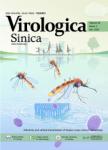Multipotent mesenchymal stromal cells are fully permissive for human cytomegalovirus infection
Multipotent mesenchymal stromal cells are fully permissive for human cytomegalovirus infection作者机构:State Key Laboratory of VirologyWuhan Institute of VirologyChinese Academy of Sciences
出 版 物:《Virologica Sinica》 (中国病毒学(英文版))
年 卷 期:2016年第31卷第3期
页 面:219-228页
核心收录:
学科分类:1007[医学-药学(可授医学、理学学位)] 100705[医学-微生物与生化药学] 1001[医学-基础医学(可授医学、理学学位)] 100103[医学-病原生物学] 10[医学]
基 金:supported by the National Science Foundation of China (81071350,81271850,and 31170155) the National Program on Key Basic Research Project (973 program 2011CB504804 and 2012CB519003)
主 题:human cytomegalovirus(HCMV) multipotent mesenchymal stromal cells(MSCs) susceptibility umbilical cord Wharton's jelly
摘 要:Congenital human cytomegalovirus(HCMV) infection is a leading infectious cause of birth *** studies have reported birth defects with multiple organ maldevelopment in congenital HCMV-infected neonates. Multipotent mesenchymal stromal cells(MSCs) are a group of stem/progenitor cells that are multi-potent and can self-renew, and they play a vital role in multiorgan formation. Whether MSCs are susceptible to HCMV infection is unclear. In this study, MSCs were isolated from Wharton s jelly of the human umbilical cord and identified by their plastic adherence, surface marker pattern, and differentiation capacity. Then, the MSCs were infected with the HCMV Towne strain, and infection status was assessed via determination of viral entry,replication initiation, viral protein expression, and infectious virion release using western blotting,immunofluorescence assays, and plaque forming assays. The results indicate that the isolated MSCs were fully permissive for HCMV infection and provide a preliminary basis for understanding the pathogenesis of HCMV infection in non-nervous system diseases, including multi-organ malformation during fetal development.



